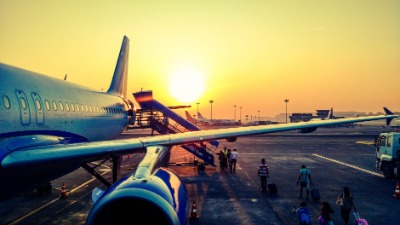Commercial Flight Crews Show Higher Cancer Rates: Study
Published Jul 11, 2018

Flight crews have higher than average rates of certain cancers, according to a study of more than 5,000 US-based flight attendants.
 "We report a higher lifetime prevalence of breast, melanoma and non-melanoma skin cancers among flight crews relative to the general population," said Irina Mordukhovich, a researcher at Harvard T.H. Chan School of Public Health and co-author of a study published Tuesday in the Journal Environmental Health.
"We report a higher lifetime prevalence of breast, melanoma and non-melanoma skin cancers among flight crews relative to the general population," said Irina Mordukhovich, a researcher at Harvard T.H. Chan School of Public Health and co-author of a study published Tuesday in the Journal Environmental Health.
"This is striking given the low rates of overweight and smoking in this occupational group," she said in a statement.
Out of 5,366 flight attendants who took part in the study, just over 15 percent reported ever having been diagnosed with cancer. Taking age into account, the study found a higher prevalence of cancer in flight crew for every type of cancer examined. Some 3.4 percent of the women who flew for a living had breast cancer, compared to 2.3 percent in the general population.
The flight-crew rate was 0.15 percent compared to 0.13 percent for uterine cancer; 1.0 compared to 0.70 percent for cervical cancer; 0.47 compared to 0.27 percent for stomach or colon cancer; and 0.67 compared to 0.56 percent for thyroid cancer. The risk of breast cancer was higher in women who had never had children, as well as those who had three or more. Having no childlen was a known risk factor, noted Mordukhovich.
Cosmic Radiation
"But we were surprised to replicate a recent finding that exposure to work as a flight attendant was related to breast cancer exclusively among women with three or more children," she said. "This may be due to combined sources of circadian rhythm disruption -- sleep deprivation and irregular schedules -- both at home and at work."
Male flight attendants were found to have higher rates of skin cancer -- 1.2 and 3.2 percent for melanoma and non-melanoma cancer, respectively, compared to 0.69 and 2.9 percent for the adult population as a whole. This was especially true if the attendants working before smoking on planes was banned in the United States, in 1998.
Flight crews are routinely exposed to known and probable carcinogens, including cosmic radiation from space, circadian rhythm disruption, and possible chemical contaminants. The authors used 2013-14 data from the Flight Attendant Health Study, which has been tracking the health of selected flight crew since 2007. This was compared to data from 23,729 men and women with similar economic status who participated in the National Health and Nutrition Examination survey during the same years.
Over 80 percent of the flight attendants who took part in the study were women. On average, attendants were 51 years old and had been working in the profession for just over 20 years.
Interesting Study. What Are Your Thoughts?
Do You Know Anyone Who Is In A Flight Crew?

 Facebook
Facebook Twitter
Twitter


